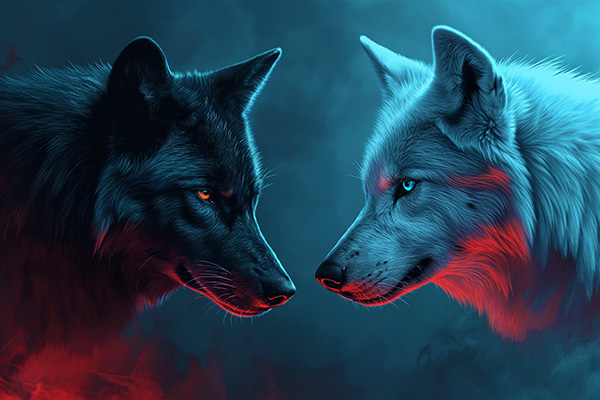ancestral legacy
Honor Your Pagan Heritage This Halloween
 Samhain holds special significance for those who practiced paganism in a past life, especially those who were involved in magical practices as seers, soothsayers, druids, and witches.
Samhain holds special significance for those who practiced paganism in a past life, especially those who were involved in magical practices as seers, soothsayers, druids, and witches.
For us, this time of year evokes a deep sense of nostalgia, spiritual reorientation, and a return to ancient wisdom as the veil between worlds thins and we reconnect with our ancestors and the spirit realms.
Samhain is an ancient Celtic festival marking the end of the harvest season and the beginning of winter, traditionally celebrated from October 31 to November 1. It is one of the four great Gaelic seasonal festivals, along with Imbolc (February 1), Beltane (May 1), and Lughnasadh (August 1).
In Celtic tradition, Samhain (pronounced “sow-in”) is a liminal time when the boundary between the physical and spiritual worlds is thinner, allowing the spirits of our deceased loved ones, ancestors, and other spirits to cross over more easily.
In ancient times people would light fires and wear costumes to ward off harmful spirits, while also honoring their ancestors with offerings of food and drink.
Samhain is considered the origin of modern Halloween traditions, although Halloween has evolved and incorporated elements from other cultures to become a mostly secular and commercial holiday. For Neopagans and Wiccans, Samhain remains an important festival for honoring the dead, celebrating the cycle of life, death, and rebirth, and connecting more deeply with the spirit realm.
The True Meaning Of Being Balanced
 Spiritual teachers often emphasize the importance of achieving and maintaining balance as a fundamental aspect of well-being, personal growth, and spiritual development.
Spiritual teachers often emphasize the importance of achieving and maintaining balance as a fundamental aspect of well-being, personal growth, and spiritual development.
But what does it really mean? Is it about having a healthy work-life balance? Is it about a balanced diet or exercise routine? No, these are just some of the smaller elements of achieving true balance.
Balance refers to being holistically balanced in all aspects of our existence: body, mind, and spirit. Achieving and maintaining balance means creating a harmonious and integrated life in which all aspects of our being support each other, leading to overall well-being and a deeper connection with our true self.
We are more than our physical health, appearance and fitness levels. We are more than our thoughts, ideas, and knowledge. And we are more than our spiritual beliefs and practices. We are a wondrous compilation of all these things that make up our body, mind, and spirit. When any part of us is unhealthy or dysfunctional, it disrupts our alignment with our higher self. This is the true meaning of being out of balance.
Striving to be true to your higher self should always be your priority. Your higher self is the real you, the you that exists in harmony with the universe and is an expression of the divine. It is only when we are in alignment with our higher self that the world truly opens up for so much more to flow into our lives…instead of out of them.
The Mystical Properties Of Ancient Amber
 Crystals, gemstones, and incense have been widely used in spiritual, esoteric, and healing practices throughout the ages and continue to be popular today.
Crystals, gemstones, and incense have been widely used in spiritual, esoteric, and healing practices throughout the ages and continue to be popular today.
But there is another type of natural material that does not enjoy the same level of widespread recognition and popularity, despite its unique metaphysical properties and significance in various cultures and mystical traditions.
Resins are less well known and used by modern practitioners. I find that many people are unfamiliar with the various types of resins available and their metaphysical properties.
Compared to crystals, gemstones, and incense, which have gained widespread popularity in recent years, especially through social media and the Internet, resins have received less attention and exposure.
As a result, people may be less likely to encounter resins in their exploration of metaphysical tools and practices.
I also find that people who are at least somewhat familiar with resins tend to associate them with their use as incense. Resins such as frankincense, myrrh, copal, and others are often burned as incense to purify spaces, objects, and individuals. The smoke cleanses negative energies, purifies the aura, and creates a sacred atmosphere for rituals and ceremonies. Continue reading
Exploring Your Past Life Memories
 Have you ever had such a strong sense of déjà vu that you just couldn’t shake it? Or have you had a strange yet familiar dream about a particular place or time in history? Chances are you were experiencing a past-life memory.
Have you ever had such a strong sense of déjà vu that you just couldn’t shake it? Or have you had a strange yet familiar dream about a particular place or time in history? Chances are you were experiencing a past-life memory.
Both our physical body and our soul essence carry deep echoes of the past. We inherit cellular memories from our ancestors that are embedded in the genetic code of our bodies, while our souls carry energetic imprints and karmic wisdom from our previous incarnations.
Our soul is eternal and transcends individual lifetimes, accumulating wisdom, experiences and lessons across multiple incarnations.
Intense traumas, transformative events, and extreme hardships experienced by both our ancestors and ourselves in past lives are etched into our physical and spiritual DNA.
The legacy of these cellular and soul memories sometimes resurfaces in our present lives in a variety of ways. For example, it may manifest as an inexplicable behavior, an irrational phobia, an unusual talent, or a strange preference that can be traced back to past life experiences.
Make Money The Root Of All Good!
 The desire for financial security and increased wealth often conflicts with some people’s deeply held spiritual beliefs, causing them much inner conflict and guilt. Sayings like “money can’t buy happiness,” “money is the root of all evil,” and “you can’t take it with you” don’t help either.
The desire for financial security and increased wealth often conflicts with some people’s deeply held spiritual beliefs, causing them much inner conflict and guilt. Sayings like “money can’t buy happiness,” “money is the root of all evil,” and “you can’t take it with you” don’t help either.
But what if we flipped the script? What if the path to money and wealth is also the path to peace and deeper fulfillment in our lives?
There is also the saying: “Money is a good servant, but a bad master.” What if money in the hands of kind, compassionate and conscious people is exactly what the world needs?
What if we stopped thinking of money as evil and started thinking of it simply as a tool for your spiritual growth and fulfillment? What if we began to see money as something good and benevolent that can be used for the greater good?
As spiritual beings, we chose to incarnate into this very time-space reality, fully understanding the rules of this dimension. One of the rules we understood was the need for physical survival and material security in this world.
Many generations of ancestors who incarnated before us fought hard to survive here in physical form, inventing new and clever ways to make the struggle to keep body and soul together a little easier for us. In the process, they co-created the Earth reality as we know it today – a co-created reality that revolves around a monetary economic system, for better and worse.
The Ancient Wisdom Of The Two Wolves
 The story of the Two Wolves holds a special place among my childhood favorites. The moral of this Native American wisdom tale, thought to have originated with the Cherokee tribe, serves as a daily guiding light in my life.
The story of the Two Wolves holds a special place among my childhood favorites. The moral of this Native American wisdom tale, thought to have originated with the Cherokee tribe, serves as a daily guiding light in my life.
I must confess, there is some sentimental bias on my part, as this story also brings back lovely memories of my remarkable grandfather, Sequoia, a former medicine man and chief of the Cherokee Nation.
Variations of the story exist in various Native American cultures, and it typically goes like this:
One evening, an old Cherokee is teaching his granddaughter about life and says, “My daughter, a fight is going on inside all of us each day. It is the battle between the two wolves.”
“One wolf is evil — anger, envy, jealousy, sorrow, regret, greed, arrogance, self-pity, guilt, resentment, inferiority, lies, false pride, superiority, and ego. The other wolf is good — joy, peace, love, hope, serenity, humility, kindness, benevolence, empathy, generosity, truth, compassion, and faith.”
The granddaughter thinks about it for a minute and then asks her grandfather, “Which wolf will win?”
Transform Your Life With Sustainable Resolutions
 Every new year, I hear my clients complain about what they hope to change about themselves, what they want to change about themselves, or what they should be changing about themselves.
Every new year, I hear my clients complain about what they hope to change about themselves, what they want to change about themselves, or what they should be changing about themselves.
I then ask them why they are not claiming their power to change right now?
You do not have to wait until the New Year or some other major life event to make a change in your life. Once you’ve decided on a new path or course of action, the key is to stick with it for the long haul, taking small steps every day.
The Japanese call this kaizen, a philosophical concept that emphasizes continuous improvement, often in small increments. The idea is that by making consistent progress, even if it is just a little bit each day, you can eventually achieve significant results.
Sustainability should be the ultimate goal of whatever you decide to change in your life. While New Year’s resolutions are all noble and lofty, you have to acknowledge the inherent resistances and blockages you carry within and agree to be patient with yourself in order to ultimately get there.
I’m still working on some New Year’s resolutions I made in 2016. Do I look back in horror and say, “Why is it taking so long?” or “I really should be doing better!” Sometimes, yes! Do I use that as an excuse to backslide, fall off the wagon, or throw in the towel? Not at all, mostly because I’ve come to realize that if I hadn’t decided years ago to make those resolutions to make powerful changes in my life, I’d still be where I was, or worse. I’d be living a life of regret, not progress.